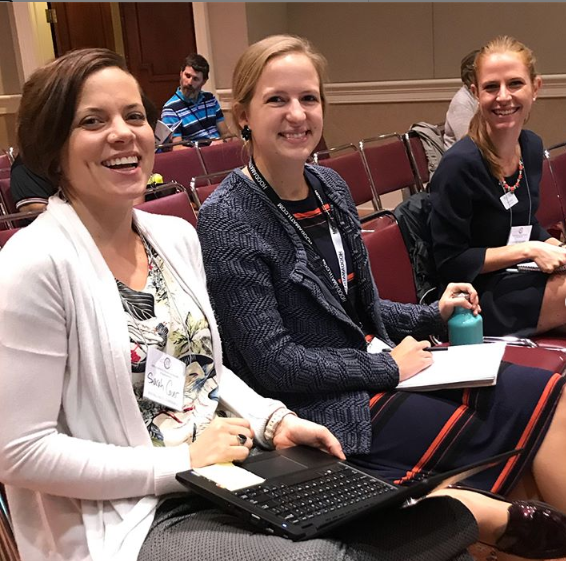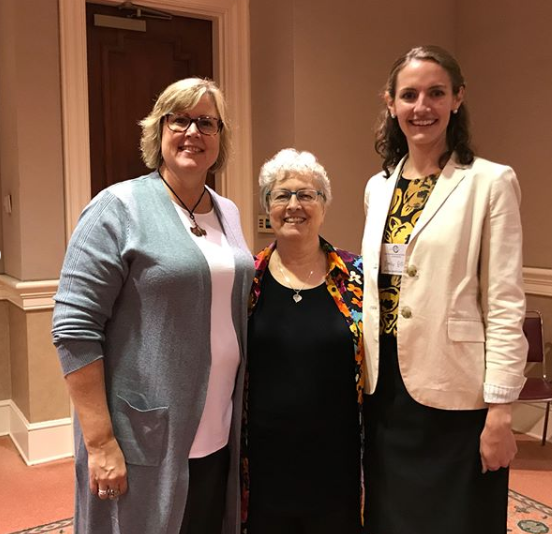2018 NC Council of Teachers of Mathematics Conference
January 3, 2019
By Heart Program Managers Sarah Cover and Kelsey Ripley
Sarah and I joined the Heart Math Tutoring team as Program Managers this summer, and in October, we had the opportunity to join Heart Program Director Cydney Kramer in attending the North Carolina Council of Teachers of Mathematics Conference (NCCTM) in Greensboro, NC. We were joined by hundreds of other North Carolina math teachers, facilitators, and researchers. It was inspiring to be surrounded by so many other education professionals who are working to creatively and effectively address the challenges of math instruction. As a Heart Tutoring team, we had many of our mathematical beliefs confirmed, and we also learned important new things about how to best support our students and families! We’ve summarized some of our findings below.

Heart Tutoring Program Coordinators Sarah Cover and Kelsey Ripley with Heart Program Director Cydney Kramer at the North Carolina Council of Teachers of Mathematics Conference (NCCTM) in Greensboro, NC.
The Power of Productive Struggle
The best way to help a student is to be less helpful. While seemingly contradictory, the best action we can take for our students is to step back and allow them the time and space to struggle through solving a problem. The notion of productive struggle maintains that by allowing students to experiment with different strategies, they will figure out what works best for them, rather than imitating procedures they don’t fully understand. This exploration is key to their understanding of not only a particular concept, but also key to what mathematics is about! Thanks to Heart’s one-on-one model, we have the time to encourage productive struggle in our students, allow them to explore new concepts, and support them as they work through their math anxieties. Should your students read a word problem and stop, waiting for instructions on how to solve it, ask them: “What is this problem about in your own words? What information do you know? What information do you need to know?” Give your students the opportunity to solve the problem however they’d like, then ask them to explain their reasoning. By sitting back and allowing your students to tackle the problem on their own, you are showing them that you trust their learning process. Struggling through math concepts provides students the opportunity to take control of their learning and grow their thinking!
Discovery Through Assessments
“Give children time to work on a concept in a million different ways.” In a keynote session delivered by Kathy Richardson, we were reminded of the value that time and variety add to the learning process. Often assessments can take the form of a checklist or a series of tasks that students “ought to know.” What if we changed our perspective and instead treated assessments as exploratory opportunities to learn what students actually know? This approach can allow us to assess more frequently and more effectively, driving our instruction toward individual student needs. When we approach math (and math assessments) as a sense-making process, rather than a box to be checked, we give students the opportunity to discover what they know and what they do not yet understand. At Heart, our tutoring hour each week is designed to offer students time for that discovery. We use an assortment of materials and methods throughout our curriculum and mini-assessments to clarify our understanding of each student’s progress. The focus of an assessment doesn’t have to be on getting the right answer, but rather on the math making sense.
What Does Math Practice Look Like at Home?

Heart Tutoring Executive Director Emily Elliott with keynote speaker and leading educator on elementary mathematics, Kathy Richardson
While it’s relatively common knowledge that families should read with their child in the early years, how to support your child in building math foundations is often more ambiguous. Studies have shown that if students don’t find meaning or engagement in math, they can lose motivation as early as first grade. Not only does this finding affirm Heart’s emphasis on elementary instruction, but it also reveals the urgent need to support connections between home and school environments in order to make math more meaningful for our kids. Many families see math as a static set of skills to be learned in a classroom, but math in the early years is much more about play, reasoning, and exploratory problem solving. Parents don’t need a degree in algebra to support the foundational learning of their child. Instead, they simply need the time and space to play! This learning looks like sitting on the floor and counting out a series of objects or putting together a puzzle and describing the process of fitting the pieces together. The discovery of math can be found everywhere – it’s just about knowing what types of questions to ask. For more ideas about how to foster meaningful math at home, check out our Heart Family Page!
Categories
- Blog (252)
- Events (28)
- Grants and Funding News (33)
- Heart Families (9)
- Heart News (152)
- Heart Staff (16)
- Math Matters (38)
- Press (65)
- Student Spotlight (1)
- Uncategorized (43)
- Volunteer Partners (12)
- Volunteer Resources (41)
- Volunteer Spotlight (52)
Recent Posts
- 2025 Volunteer Appreciation Month Spotlight Series
- Tutor Spotlight: LaShurn Purnell
- 2024 NAEP Results
- Heart Featured on Charleston’s Live 5 News
- Racing to 100 Tutors Across the Carolinas!
- Accelerate and Johns Hopkins University Visit HMT Tutoring Session
- Tutor Spotlight: Libby Anderson
- Tutor Spotlights: Alyson and Michael Fotia
- Heart Featured on Winston-Salem’s WXII 12 News
- Volunteer with Heart!

